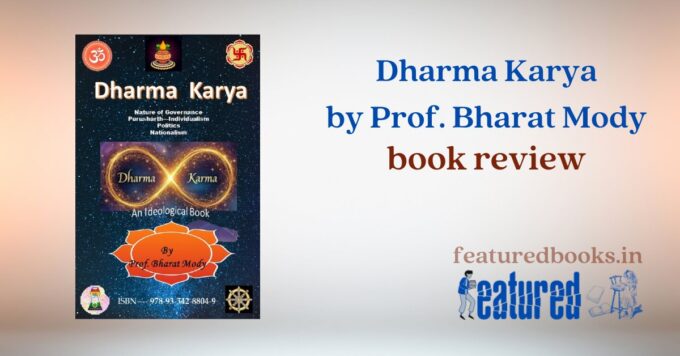DHARMA KARYA: An Ideological Book by Prof. Bharat M. Mody is a provocative and ambitious work that seeks to redefine the ideological, philosophical, and political foundations of India and the world. Published in 2022, the book presents a comprehensive critique of post-independence governance in India and proposes a radical reimagining of societal structures based on the principles of Sanatan Dharma. While the book’s audacious propositions and ideological fervour make it a significant contribution to contemporary discourse, it also invites scrutiny regarding its feasibility, inclusivity, and alignment with democratic values.
Ideological Foundations and Critique of Contemporary Governance
The book by Bharat Mody may be positioned alongside titles by Hindu-centric ideologues who emphasise an Indian way, or rather a Bharat way of living, thinking, and running critical, centralised schemes like education, healthcare, and governance.
At the heart of DHARMA KARYA lies a scathing critique of India’s post-independence leadership and governance structures. Prof. Mody contends that figures like Mahatma Gandhi and Jawaharlal Nehru were “British lackeys” who lacked a proper understanding of freedom, independence, and sovereignty. He posits that the leadership’s decisions led to a “rudderless” nation, adopting a “pseudo democracy” characterised by centralised power and a lack of philosophical grounding. This critique extends to the Indian Constitution, which Prof. Mody argues mirrors colonial laws and lacks a value-based framework. He asserts that the absence of a philosophical ethos in governance has resulted in ideological decline and societal fragmentation.
While the book’s critique is compelling, it raises questions about historical interpretation and the complexities of India’s struggle for independence. The characterisation of key leaders as “puppets” oversimplifies the nuanced political dynamics of the time. Furthermore, dismissing the Constitution as a colonial relic overlooks the contributions of Dr B.R. Ambedkar and other framers who endeavoured to create a document that balanced modern democratic ideals with India’s diverse cultural heritage. A more nuanced analysis would consider the challenges faced by the leadership in navigating the post-colonial landscape and the compromises inherent in nation-building.
Philosophical Reorientation: Sanatan Dharma as a Blueprint for Society
Prof. Mody’s proposition to base societal structures on Sanatan Dharma presents a radical departure from contemporary norms. He defines Sanatan Dharma not as a religion, but as a “way of life” that encompasses scientific principles, cultural richness, and ethical values. The book advocates for a governance model rooted in individual responsibility, emphasising the pursuit of Purusharth (righteousness, action, pleasure, and prosperity) as the foundation for societal well-being. This approach seeks to merge governance with spiritual and ethical dimensions, aiming to establish a “just, benevolent, and scientific world community.”
While the integration of ethical principles into governance is commendable, the practical application of such a model warrants scrutiny. The emphasis on individualism and self-interest, as interpreted through Purusharth, may conflict with the collective responsibilities inherent in a diverse society. Moreover, the proposal to remove terms like “Socialistic” and “Secular” from the Constitution and to classify citizens based on religious identity raises concerns about inclusivity and the potential marginalisation of minority communities. A governance model that intertwines ethical values with political structures must ensure that it upholds the principles of equality, justice, and pluralism.
Educational and Healthcare Reforms: A Return to Tradition
In the realms of education and healthcare, DHARMA KARYA advocates for a return to traditional systems. The book criticises the colonial-era Macaulay education system for creating a sub-class of workers and job-seekers, proposing a shift to the Vedic Gurukul system. This system is portrayed as holistic, focusing on spiritual knowledge, moral development, and practical skills. Similarly, in healthcare, the book advocates for the adoption of Ayurvedic principles over the modern, system-based, specialist approach, emphasising prevention, lifestyle maintenance, and the integration of Allopathy, Ayurveda, and Homoeopathy.
While the valorisation of traditional systems is essential, the book’s proposals require careful consideration. The Gurukul system, though rich in cultural heritage, may not align with contemporary educational needs and global standards. The integration of various medical systems necessitates rigorous scientific validation to ensure efficacy and safety. A balanced approach that respects traditional knowledge while embracing modern advancements is essential for holistic development.
Political Reforms: The Vision of Ram Rajya
The culmination of Prof. Mody’s vision is the establishment of Ram Rajya, a governance model that embodies ethical principles, individual responsibility, and societal harmony. He proposes a “Direct Political Republic” system, characterised by mechanisms like referendums, initiatives, and recalls, to ensure that power rests in the hands of the people. This system aims to replace the current parliamentary democracy, which Prof. Mody critiques as a “pseudo democracy” that concentrates decision-making in the hands of a few.
The concept of Ram Rajya, rooted in ancient Indian ideals, offers an aspirational model of governance. However, its implementation in the contemporary context poses significant challenges. The complexities of modern societies, characterised by diverse populations and global interdependencies, require governance structures that are adaptable, inclusive, and grounded in democratic principles. A political system that emphasises direct participation must also ensure that it protects minority rights, upholds the rule of law, and fosters social cohesion.
Conclusion: A Visionary Yet a Daring Proposition
DHARMA KARYA presents a bold and visionary reimagining of societal structures, advocating for a return to traditional values and principles. Prof. Mody’s critique of contemporary governance and his proposals for reform challenge prevailing norms and stimulate critical discourse. However, the book’s radical propositions necessitate careful examination and dialogue. The integration of ancient philosophical ideals with modern governance requires a nuanced approach that considers the complexities of contemporary societies and ensures that reforms uphold the principles of democracy, inclusivity, and justice. While DHARMA KARYA may not offer immediate solutions, it undoubtedly contributes to the ongoing conversation about the future of governance and society in India and beyond. Additionally, discussing the solutions, the book certainly presents some long-term and visionary propositions…
You can obtain a copy from Amazon India by clicking here.
Review by Rahul for Featured Books





